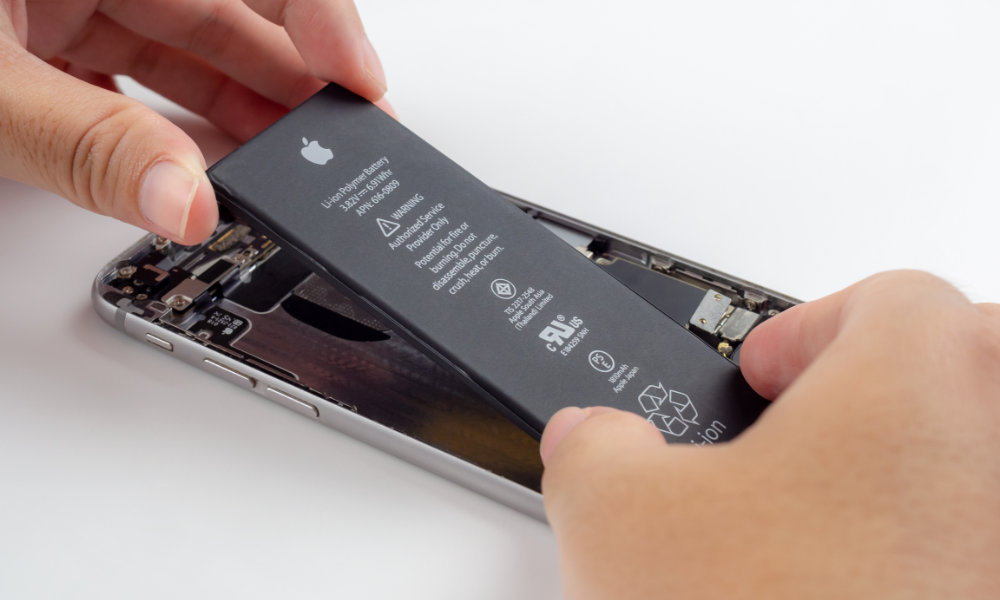The EU Wants the iPhone to Have a Removable Battery
 Credit: Poravute Siriphiroon / Shutterstock
Credit: Poravute Siriphiroon / Shutterstock
Toggle Dark Mode
Now that it’s effectively decided to enforce a common charging standard, it seems that the European Union is taking aim at another smartphone feature that it doesn’t like: built-in batteries.
According to a new report by Dutch publication Het Financieele Dagblad, shared by TechRadar, the European Commission is seeking to pass legislation that would force all smartphone manufacturers selling devices in the EU to make sure that the batteries are removable and user-replaceable.
It may be hard to believe now, but there was once a day when it was the norm to be able to carry around a spare battery for your mobile phone and swap it out as needed. In fact, when Apple’s original iPhone debuted in 2007, it was one of the only smartphones to adopt a built-in, non-user-replaceable battery, in a move that actually sparked a huge number of complaints from users who were concerned about being stuck with a dead iPhone.
Perhaps ironically, however, this is another area in which Apple “courageously” led the way, and what was one of the harshest criticisms of the iPhone in those early days quickly became the new standard for smartphones as every other manufacturer followed suit, realizing that they could create slimmer and more waterproof phones that cost less to manufacture if they decided to forego the user-accessible battery compartment.
While many “feature phones” still include removable batteries, today it’s virtually unheard of for a smartphone to include this. Instead, the industry has moved on to a wide variety of portable charging packs that connect to the USB-C or Lightning port or even offer wireless charging on the go. Combined with the reality that the iPhone now provides all-day battery life for most users, and overnight charging is now the standard, the old fears of being stuck with a dead mobile phone are mostly a thing of the past.
What This Actually Means
The source for this information appears to have come from leaked documents from agencies within the European Union seen by Het Financieele Dagblad, so the proposals aren’t otherwise public yet, and it’s entirely possible that it might not even happen. However, it does seem to be in line with the EU’s objectives regarding the elimination of e-waste.
It’s too early to tell exactly what form such legislation would take, but it seems unlikely that this would be a return to the days of yesteryear when users could simply swap batteries when they needed more power on the go.
Firstly, the EU’s primary objective is to make sure that users can easily swap out a battery when it wears out and no longer holds a charge, without needing to take it to an Apple Authorized Service Provider to pay for a battery replacement. This means that Apple and other smartphone manufacturers wouldn’t likely be required to make the battery easily user-accessible, but rather merely to ensure that the user is able to get at the battery when a final replacement is needed. They also wouldn’t necessarily need to sell replaceable batteries as if they were everyday accessories.
For some pretty valid reasons such as waterproofing and aesthetics, Apple is very likely to resist such a change, and will likely do the bare minimum that EU regulations would require. This means we’re very unlikely to see an easily-snapped-off battery cover, since Apple could probably satisfy the EU’s requirements even if the user were required to use a screwdriver or other tools to access the iPhone battery—as long as they were commonly-available tools, of course (meaning Apple would have to switch away from its crazy pentalobe screws, at least for the outside casing).
Unlike the common charging standard battle, however, Apple wouldn’t be alone in resisting the EU directive in this case, since many other manufacturers like Samsung similarly prefer to use built-in batteries now, and would have to deal with the same design issues if they were forced to switch to a user-replaceable model.
At this point, however, Apple is likely still years away from having to deal with this. With 27 countries making up its membership, the European Union moves glacially slow even by the standards of most governments. It’s taken over a decade for it to settle the common charging debate, and even that’s still years away from being enforced — by which time it probably won’t matter anymore.
Likewise, this proposal on user-replaceable batteries has yet to even be formally tabled, much less drafted, discussed, debated, and decided upon. By the time the EU figures this one out, smartphones will likely have switched to an entirely new battery technology.
[The information provided in this article has NOT been confirmed by Apple and may be speculation. Provided details may not be factual. Take all rumors, tech or otherwise, with a grain of salt.]






